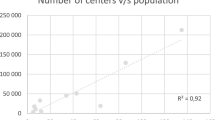Abstract
Background
Simulation-based education is a modern training modality that allows healthcare professionals to develop knowledge and practice skills in a safe learning environment. The College of Anaesthetists of Ireland (CAI) was the first Irish postgraduate medical training body to introduce mandatory simulation training into its curriculum. Extensive quality assurance and improvement data has been collected on all simulation courses to date.
Aims
Describe The College of Anaesthetists of Ireland Simulation Training (CAST) programme and report the analysis of course participants’ feedback.
Methods
A retrospective review of feedback forms from four simulation courses from March 2010 to August 2016 took place. Qualitative and quantitative data from 1069 participants who attended 112 courses was analysed.
Results
Feedback was overall very positive. Course content and delivery were deemed to be appropriate. Participants agreed that course participation would influence their future practice. A statistically significant difference (P < 0.001) between self-reported pre- and post-course confidence scores was observed in 19 out of 25 scenarios. The learning environment, learning method and debrief were highlighted as aspects of the courses that participants liked most.
Conclusions
The mandatory integration of CAST has been welcomed with widespread enthusiasm among specialist anaesthesia trainees. Intuitively, course participation instils confidence in trainees and better equips them to manage anaesthesia emergencies in the clinical setting. It remains to be seen if translational outcomes result from this increase in confidence. Nevertheless, the findings of this extensive review have cemented the place of mandatory simulation training in specialist anaesthesia training in Ireland.
Similar content being viewed by others
References
Wang EE (2011) Simulation and adult learning. Disease-a-month : DM 57(11):664–678. https://doi.org/10.1016/j.disamonth.2011.08.017
Preparing Ireland’s Doctors to meet the Health Needs of the 21st Century: Report of the Postgraduate Medical Education and Training Group. 2006
Burlacu C. The development of the national simulation training programme in anaesthesia. Irish Medical Times 14th April 2010
Flin R, Patey R, Glavin R, Maran N (2010) Anaesthetists’ non-technical skills. Br J Anaesth 105(1):38–44. https://doi.org/10.1093/bja/aeq134
Clapper TC (2010) Beyond Knowles: what those conducting simulation need to know about adult learning theory. Clin Simulation In Nursing 6(1):e7–e14
Bong CL, Fraser K, Oriot D (2016) Cognitive load and stress in simulation. In: Grant VJ, Cheng A (eds) Comprehensive healthcare simulation: pediatrics. Springer International Publishing, Cham, pp 3–17. https://doi.org/10.1007/978-3-319-24187-6_1
Kirkpatrick DL, Kirkpatrick JD (2006) Evaluating training programs: the four levels, Third edn. Berret-Koehler, California
Lorello GR, Cook DA, Johnson RL, Brydges R (2014) Simulation-based training in anaesthesiology: a systematic review and meta-analysis. Br J Anaesth 112(2):231–245. https://doi.org/10.1093/bja/aet414
Carter OBJ, Mills BW, Ross NP, Miles AK, Mould JM, O’Brien RP (2016) Assessing simulation-based clinical training: comparing the concurrent validity of students’ self-reported satisfaction and confidence measures against objective clinical examinations. BMJ Simulation and Technol Enhanced Learning 2:30–34
Parmac Kovacic M, Galic Z, Jerneic Z (2014) Social desirability scales as indicators of self-enhancement and impression management. J Pers Assess 96(5):532–543. https://doi.org/10.1080/00223891.2014.916714
Author information
Authors and Affiliations
Corresponding author
Ethics declarations
Conflict of interest
The authors declare that they have no conflict of interest.
Human and animal rights and informed consent
This article does not contain any studies with human participants or animals performed by any of the authors.
Rights and permissions
About this article
Cite this article
Cafferkey, A., Coyle, E., Greaney, D. et al. The College of Anaesthetists of Ireland Simulation Training programme: a descriptive report and analysis of course participants’ feedback. Ir J Med Sci 187, 1051–1056 (2018). https://doi.org/10.1007/s11845-018-1778-1
Received:
Accepted:
Published:
Issue Date:
DOI: https://doi.org/10.1007/s11845-018-1778-1




